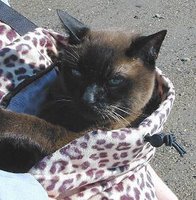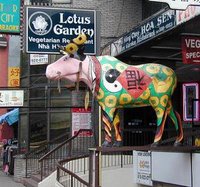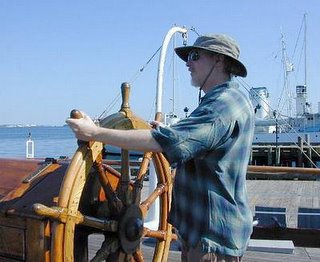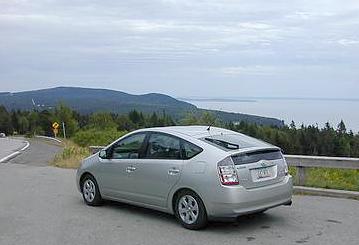skip to main |
skip to sidebar
The first rain quiets the din of the earth
It brings with it a lacquer of indifference
It obeys only gravity, or it would fall up
and coat the heavens.
The second rain comes in the jacketed night
It enters the house, washes away the foundation
Climbs up the stairs and makes a mist of your visions
Leaves stains in the bed where you had been.
The third rain cracks ground with a shattering wetness
Cities subsumed in mud-flow ravines
Wobbling stars in a broken-back night
By day, the sun is as blue as the sea.
The fourth rain, the fourth rain, is green and sweet-smelling
It comes and fills up the things that it touches
The woodwork, the stonework, the flowers, the children
Inside, it courses and sits in low pockets.
The fifth rain is rhythm and chants, incantations
A begging of heavens, a washing insistence
A random commital of calls on the wakened
It pulls things up past the clouds in the sky.
The last rain comes once, on a clear day of sunlight
Logic disputes its very existence
It drops in the eyes and the ears of one personRuns into the mouth, and paints exhalations.
There was a famous moment in TV history, on the show Happy Days, when Henry Winkler’s character Fonzie is on water skis and literally jumps over a shark. That scene symbolized, to many fans anyway, the show’s decline, a desperate attempt to grab ratings.
“Jumping the shark” has since come to signify the moment at which something has obviously outlived its us efulness, or strayed so far beyond its original welcome that it is now tangential and obsolete. Besides TV shows, the phrase is used for music groups, celebrities, movies, and even politicians. It could be argued, for example, that Bill Clinton jumped the shark with the Monica Lewinsky affair (no bad pun intended!) The American people seem to have decided that George W. Bush jumped the shark with Hurricane Katrina, although a substantial number of us would trace that moment back to the invasion of Iraq.
efulness, or strayed so far beyond its original welcome that it is now tangential and obsolete. Besides TV shows, the phrase is used for music groups, celebrities, movies, and even politicians. It could be argued, for example, that Bill Clinton jumped the shark with the Monica Lewinsky affair (no bad pun intended!) The American people seem to have decided that George W. Bush jumped the shark with Hurricane Katrina, although a substantial number of us would trace that moment back to the invasion of Iraq.
Allow me to use the phrase in medicine. In my case, anyway, single-agent Rituxan has jumped the shark. Readers of this blog will recall that I was diagnosed with chronic lymphocytic leukemia in September 2003. I was already at Stage 2, with swollen spleen and nodes. After much research and discussion, I had eight weeks of single-agent Rituxan starting in January 2004. I had four weeks starting April 2005. I had eight weeks starting in October 2005.
All this Rituxan has allowed me to play for time, which is what my original goal was in using it. I feel fine, my platelets are stable in the 160s and my hemoglobin is 15. Rituxan has reduced my oversized spleen, which does return to moderate enlargement between treatments. It has been effective on small nodes, but has never done much for those beyond 2 cm. (My largest ones are in the 3 to 4 cm range; I have never gotten the huge ones characteristic of some patients.) My disease today appears to be about where it was when I was diagnosed.
So far, so good. But my bloodwork tells another story. As of last week, when I visited my oncologist for my three-months-after-the-end-of-last-Rituxan-infusion checkup, my absolute lymphocyte count was 38,000. It took seven months for it to reach that point following my first Rituxan cycle. It took four-and-a-half months to reach that point after my second. Now we’re down to three.
Peripheral blood numbers don’t tell the whole story, of course, but there is no sign that Rituxan’s effectiveness on my bulky disease is getting any better. The bulk, decently reduced after my first Rituxan, has essentially found a plateau. As my oncologist said last week, “You’re bulky, but you wear it well.”
She also said “I think we have to add something to the Rituxan next time.” I hate to say it, but I have to agree with her.
I could continue to use Rituxan as a single agent, likely with diminishing results, and always risking some of the rare but serious side effects -- skin problems, delayed onset neutropenia, and so forth. Up until now, I have been lucky in not having any signs of the above. And Rituxan has continued to work well in my peripheral blood during all three courses -- my ALC bottomed at 2.2 the first time, 4.6 the second, 5.1 the third.
But given its value in combination therapy, I see no point in using it up completely, jum ping and rejumping the shark as it were. It am fairly confident that it still has enough oomph in my case to work well in combination with something else.
ping and rejumping the shark as it were. It am fairly confident that it still has enough oomph in my case to work well in combination with something else.
When I began to play for time more than two years ago, I hoped a shiny, happy “something else” would come along, a choice so obvious that all I would have to do is sit back in my chair like Jean-Luc Picard, glance at my oncologist, and say, “Make it so.”
New wrinkles
Alas, progress has been slow but steady. While there has been nothing that really puts a dent in the disease, there have been many new wrinkles.
In a couple of years we will likely have Humax CD-20, a fully humanized monoclonal antibody, that could replace Rituxan in CLL, and which may (or may not) prove to be somewhat more effective. It has been fast-tracked by the FDA and is currently in trials. (Rituxan has never had Phase III trials in CLL, and so as common as it has become in CLL treatment, it has never received official FDA approval. Humax is seeking that approval, and if it gets it, bye-bye Rituxan. Start thinking “HF” and “HFC.”)
There are some interesting trial possibilities with HSP-90 inhibitors but they are just that, possibilities, and they may not be viable in addressing my case of CLL. Nonetheless, I will keep my eyes open.
Another wrinkle has been R + HDMP (High Dose Methyl Prednisolone), the trial in chemo-naïve patients at UC San Diego. To better these remissions, some patients received Campath afterward to clear up residual disease. Anecdotal reports and one published report indicate some early success with this protocol, and it is not mutagenic. But it is highly immunosuppressive, and the long-term effects of all that HDMP are not known, as is the duration of remissions received.
Readers may recall that I have skin cancer issues, which is why I am leery of therapy that is too immunosuppressive, and which is one reason why I would like to avoid fludarabine until absolutely necessary. I am also Coombs positive, a candidate for autoimmune hemolytic anemia, and fludarabine has been known to catalyze it.
In considering what to do next, I am still looking at the long term. I want to retain the chance for one excellent, deep remission, possibly as a prelude to a stem-cell transplant, and would be tempted to reserve Campath, and perhaps fludarabine, for that effort.
I am IgVH unmutated -- I have a fast-growing disease -- but am CD 38 negative and have a “normal” FISH result. It appears that whatever chromosomal abnormality underlies my CLL, it is relatively benign. It is keeping the brakes on the unmutated part, at least as well as can be expected, and at least for now. So I am loathe to pick up another, more dangerous abnormality -- say the 11q or 17p deletion -- which can happen through treatment with certain drugs.
Two other options I am beginning to mull over involve Rituxan and alkalyting agents.
One is Rituxan and chlorambucil, the concept of which has received an endorsement from Dr. Terry Hamblin on the ACOR list. There have been no trials of this in CLL but, anecdotally, some patients have done rather well with it. My concern is that chlorambucil can cause marrow problems and can be mutagenic. But I am reaching the stage where I have to take more chances to keep my disease in check, and the concept of trying for a two-year-or-so remission with R + low-dose Cb is somewhat tempting -- especially as it may be repeatable and I can still “graduate” to fludarabine combinations later on.
A similar prospect is Rituxan plus cyclophosphamide plus prednisone -- R + CP -- the protocol being followed by John Wagner, who writes about it in his excellent blog. My concern here is the mutagenicy of the “C,” and whether it will be as effective as “Cb” in clearing the marrow and therefore in length and depth of remission. Sometimes vincristine is added to this protocol, for R + CVP, but vincristine is a known cause of peripheral neuropathy and I like my fingers the way they are, thank you.
Beyond these c hoices, of course, lie all the F acronyms -- RF, RF "lite," RFC, CFAR, etc. And the “P” for pentostatin, of course. There are some doctors who would look at my bulkiness and unmutated status and say that I should choose one of those. But I tend to look at my disease as half-full, so to speak: less aggressive than many unmutated cases, and present in a patient who feels fine, who has normal platelets and hemoglobin, and no "B" symptoms. If I ain't totally broke, I am loathe to try to overfix me.
hoices, of course, lie all the F acronyms -- RF, RF "lite," RFC, CFAR, etc. And the “P” for pentostatin, of course. There are some doctors who would look at my bulkiness and unmutated status and say that I should choose one of those. But I tend to look at my disease as half-full, so to speak: less aggressive than many unmutated cases, and present in a patient who feels fine, who has normal platelets and hemoglobin, and no "B" symptoms. If I ain't totally broke, I am loathe to try to overfix me.
Needless to say, my doctor and I have some mulling to do. For now, I am simply going back into “watch and wait.” I have ordered a new FISH and CD 38 test, part of the Quest monitoring package, to see if my disease may be ramping up. That will help bring the picture into a little better focus.
In the meantime, I am putting away the skis and leaving the shark alone. I am not the only patient who may be reaching this conclusion after a couple of years of single-agent Rituxan. I have friends with similar declining results, or increasing side effects.
There are those for whom Rituxan monotherapy will continue to do the job longer, people with different disease profiles, or people at earlier stages. In CLL, we all have to adapt to changing circumstances and find the right weapon for the right time. I'll keep you posted.
UPDATE
Speaking of jumping, I certainly jumped to some premature conclusions in this post; I think perhaps I had been listening to my doctor a little too closely. Sometimes it takes a while to sort things out, and blogs are real-time affairs, so one can see changes of heart and mind as time goes on.
Here I am, a year and a half later, still using Rituxan, now with occasional steroids to combat AIHA but with the added effect of knocking back the CLL. Facing the other treatment options squarely in the face made me realize that Rituxan, even if reduced in effectiveness, was still the lesser of all evils. As Winston Churchill once said, democracy is the worst form of government except for all the others. Think "Rituxan" instead of "democracy" and "chemo" instead of "government" and you see my point.
What I have realized since this post is that unless there is a specific, dangerous complication or problem that demands immediate attention, playing for time is of paramount importance. I can still hold the fort, albeit not quite as well, with ever-crappier, more inelegant Rituxan remissions. While many doctors and some learned friends might argue that I have continued to jump the shark to the point of indescribable boredom, I would point out that my show is still on the air, so to speak. Plus, the addition of steroids has given my Rituxan therapy new life.
How long can I continue this? At least a while longer, I think. Here, Sharky, Sharky . . .
-- September 23, 2007
A woman, flat-chested like a man; two dogs
lie before her like lions
at the gates of a palace.
Stately, big paws, steady gaze
Panting
Streaming spit on the beach.
A stick
behind her back
A few words,
and a few words more,
and the lecture concludes, and
she tosses the stick
ever so gently.
Dogs leap
-- the statues break --
They run for it
A twelve-foot DASH.
Trot back, one the victor
Lie politely
Surrender the stick
Drool
She nods and smiles like Queen Elizabeth
And talks, comments, commends Addresses her parliament of dogs
Drool
Drool
Dogs at the pace of croquet.
I have in front of me a display ad from our local entertainment weekly newspaper.
“Poet for hire” it reads. “To perform at your social gatherings, workshop facilitator, home schooling, poetry coach, set free your Robert Frost to perform like Mick Jagger.”
That last one grabbed me. I’m not sure I want my Robert Frost performed like Mick Jagger. Or my Emily Dickinson rapped like Eminem. Or Yeats done by the finalists from American Idol.
But I am impressed that the young man hopes to make some kind of living at being a poet. (I know it’s a man because his name is at the bottom of the ad, and I know he’s young because no one with any experience of life’s monetary obligations would have illusions about the financial potential of poetry.) Apparently he is a “Grand Slam Champion.”
If “grand slam” brings to mind golf or baseball or breakfast at Denny’s, you are sorely out of touch.
Poetry has become fashionable these days, which, considering all the other possibilities, is a good thing. College-age kids are participating in poetry slams, contests where people recite their work before an audience. I have never been to one of these; I’ve seen one on television. Perhaps I’m showing my age, but I have always regarded poetry as a private affair, something that doesn’t want to be shouted or judged in a contest. A good poem is a personal statement that needs time to sink in, time for one to dawdle over phrases and words, and for one to sit back and reflect. A poem is meant to be read and reread while sitting in a cushy armchair, in the perfect quiet late at night, perhaps a glass of Scotch at your side. At least that’s how I see it.
I have not written a poem in 15 years. I never wrote very many of them, but when I lived near the beach on the Oregon coast for a few years, I was inspired to do so. Maybe it was the waves, ever calming, that led me to a more reflective bent. Their eternal rhythm is ripe ground for thinking in rhythmic ways.
The other day, I found my file of poems from that era and I will post some of them here. And who knows, I may try my hand at a new one. Or two.
It’s not like I am a Grand Slam Champion or anything, and I have no clue how good or bad my poems are, really. Some attempt to say something deep, some are meant to paint a picture in words of a scene that captured my imagination, some are humorous throwaways. Back then, my mind wandered everywhere from mystical rains to a dead hippopotamous. It was before CLL. But the more things change, the more they stay the same. Rereading the poems, my outlook on life and death is much the same today as it was then.
This is for all the newbies out there. I remember what it was like to be in the shock and awe stage of the disease, the time right after diagnosis when it all seemed like a bad dream. With that in mind, I wrote an article for CLL Topics called "Getting a Grip." I believe now, as I wrote then, that it is essential to get a grip on the emotional and spiritual aspects of having cancer before you can fight it most effectively. Decisions made in panic, or out of fear, or wishful thinking, are not usually good decisions. And being whipsawed by anxiety and despair is no way to greet the morning every day for the rest of your life.In the article, I detail a number of strategies, some very simple, that can start you on the road to becoming less upset and more assured. These are things that worked for me, and they may or may not work for you, but it might be worth a read. Here's the link:http://www.clltopics.org/PatCor/gettingagrip.htmOne of these days I will write something here called "Keeping a Grip." Now that I'm two-and-a-half years out from diagnosis, I have settled into the living-with-it phase. It still takes work sometimes to keep a centered perspective. But, dear newbies, life goes on. If you can get to the point where you enjoy life more because you appreciate it more than you did before your diagnosis, you have found an unexpected silver lining in this experience.There is beauty, even in winter:
“A.D.” is commonly taken to mean “Anno Domini,” Latin for “In the Year of the Lord.” CLL has given it a new meaning for me: “After Diagnosis.” The anniversary of my diagnosis, and the fact that I have survived another year with chronic lymphocytic leukemia, is as significant to me as New Year’s Day. And, so, September 3, 2004 was 1 A.D. (I guess that means the date of diagnosis was Year Zero, and it was sort of a Big Zero in a cosmic sense.)
When we last left off in my personal story -- see My adventures with Dr. Do-little . . . -- it was March 2004, after my successful treatment with Rituxan. The best way to describe the months that followed is that it felt like school was out. Alice Cooper’s anthem was blasting through my head: “School's out for summer. School's out forever.”
Of course, with CLL, school is never out forever. But I was experiencing what can only be called the Joy of Remission. The crash course I had undertaken in biology, chemotherapy, and the cultural anthropolgy of the medical establishment was finished, at least for awhile.
For a few months I allowed myself the luxury of slipping back in time, to the days before I had ever heard about CLL. Marilyn and I decided to take a long bender of a vacation, which we had not done in several years. We escaped the July and August heat of A rizona and drove to New York to visit my family, continuing on to the Canadian maritime provinces.
rizona and drove to New York to visit my family, continuing on to the Canadian maritime provinces.
We had recently purchased a new Toyota Prius, which was a direct result of my disease, for CLL had reminded us that life does not last forever. We had needed a new car for some time, or at least something newer than our 1991 Ford. And while we’re not usually the sort who think it wise to buy cars new from a dealer, we decided to get what we really wanted, to let go and stop being careful. There was a Prius frenzy at the time, and we were among the few people in the country to get one for less than MSRP, which we had fully expected to pay, and so we donated the difference to CLL Topics.
The Prius performed flawlessly on our trip and became a conversation piece for other motorists on those rare occasions when we stopped at gas stations to fill up. Our other conversation piece was the 17-year-old cat, who we had decided to take along. Kitty is an experienced traveler, a feline Magellan of motels, always seeking to explore as many rooms and corridors as possible. Being a Burmese he is as social as a dog and would have preferred our company, with some occasional inconvenience, to suffering two months of abandonment with a cat sitter or in a cage at the vet’s.
We bought a special cat pouch that can be worn on the chest like a Bjorn baby carrier and we took him into  stores and wineries, where he was usually greeted with enthusiasm, although there were a few quizzical stares. But no one ever questioned the practice of bringing a cat to the deli counter. Had they done so, we had invented a tearjerker story about Fluffy’s Law, how in Arizona it was illegal to leave your pet in your car during the summer because, as the case of poor Fluffy showed, it could prove fatal. Alas, we never had to use it.
stores and wineries, where he was usually greeted with enthusiasm, although there were a few quizzical stares. But no one ever questioned the practice of bringing a cat to the deli counter. Had they done so, we had invented a tearjerker story about Fluffy’s Law, how in Arizona it was illegal to leave your pet in your car during the summer because, as the case of poor Fluffy showed, it could prove fatal. Alas, we never had to use it.
We drove up the coast of Maine, beautiful but crowded and gentrified, to the coast of New Brunswick. It was like stepping back a half century. Here were picture-perfect seaside towns with whitewashed wooden houses, seen by only the occasional tourist, where oceanfront property was laughably cheap. It was quiet and dramatic, and the drama of the scenery only increased when we entered Nova Scotia and toured Cape Breton Island.
We have always enjoyed Canada, which is kind of like a US that behaves itself. We also discovered tha t Canada has a Tim Horton’s donut shop on every other block, and the prevalence of chocolate Timbits only further endeared us to the place. And they were practically giving away Vietnamese banh mi sandwiches in Toronto's "Chinatown," where the Prosperity Moose, at left, watches over the place. Alas, as we all know, Canada is damned cold six months of the year, which is why so few people actually live there, and which is why everyone from Alberta who can afford a motor home comes to Arizona in the winter.
t Canada has a Tim Horton’s donut shop on every other block, and the prevalence of chocolate Timbits only further endeared us to the place. And they were practically giving away Vietnamese banh mi sandwiches in Toronto's "Chinatown," where the Prosperity Moose, at left, watches over the place. Alas, as we all know, Canada is damned cold six months of the year, which is why so few people actually live there, and which is why everyone from Alberta who can afford a motor home comes to Arizona in the winter.
We quietly noted my CLL anniversary on the road, and after I got home I celebrated my 48th birthday and wrote a post to the ACOR CLL list for the occasion. It summed up how I felt at the time, and I am reposting it below. Even though 2005 was to bring some troubling news, what I said then is still true today.
Today is my birthday
Today is my birthday. I don't usually give it much thought, but now that I have CLL it seems a little more significant than it used to. 
I was diagnosed a year ago, shortly before my 47th birthday. There were times at the very chaotic and panicky beginning that I wondered whether I'd make it to 48. Now I'm here, and what a year it's been. I've learned a lot of big words. I can pronounce "lymphocytic" with ease, and "chlorambucil" and "cyclophosphamide" now glide off my tongue. (I'm still having trouble with "epigallocatechin gallate," which I can barely say once, let alone three times rapidly in a row.)
Somehow I got past the shock, the confusion, the distressing realization that my first oncologist and her partner were pretty much clueless. I made it through treatment and I learned that there is a tomorrow. I've sat in the big Barcalounger at my oncologist's office, which had the subtle effect of making me not want a Barcalounger for the house (which my décor-conscious wife regards as the one good thing to come out of all this). I've learned to laugh more and cry less. My fears have largely evaporated, my initial questions have been answered, my treatment dilemnas have been solved (at least for now), and the challenge ahead is to settle into a pattern of living with the disease. We're all on watch and wait of one sort or another.
On my birthday last year I went for a hike along a beautiful stretch of a local creek. I wanted to be reminded of the beauty in the world as I began to come to grips with my CLL. I still see that beauty everywhere. It's been a year of unexpected happiness, (though I'd be lying if I didn't tell you that the thing that would make me happiest of all is if the damned disease would just go away). Still, as the old saying goes, I have somehow taken a lemon and managed to make lemonade.
My wife and I are closer together. We took a long overdue vacation. (If you saw a middle-aged couple trying to walk their cat on the beach at Inverness, Nova Scotia, that was us.) We're more focused on the important things in life, and on our goals of what we want to do and how we want  to live. As much as we can, we've stopped sweating the small stuff. A lot of people live life as if time were standing still, but I know better now. The dragon will get all of us in the end, whether we have CLL or not.
to live. As much as we can, we've stopped sweating the small stuff. A lot of people live life as if time were standing still, but I know better now. The dragon will get all of us in the end, whether we have CLL or not.
I've learned a lot about myself and about other people. My theory is that dealing with cancer magnifies who you already are. I have a neighbor who cried and gave me a big hug and wanted to hear all about it; and a relative who, always a bit self-centered and unable to cope with emotions, has ignored it completely. My theory works for patients, too. If you were predisposed to random acts of kindness before diagnosis, it makes you more that way. If you had a tendency to put others down to make yourself feel good, it brings that out even worse. Fortunately, I have encountered many remarkable people, often on this ACOR list, and feel honored to have gotten to know them.
I've learned to respect the struggle each of us makes because I know how hard it is. I've seen brave people show enormous strength, wisdom, and humor in the face of fear and disappointment. I've come to appreciate those who have lit up the internet and brought patients out of the Dark Ages thanks to their generous gifts of time, effort, and money. To those who run this list and the other discussion groups, and to the experts and all those who post, thank you. I have learned a great deal. Thank you also to Granny Barb,  wherever you are, who I never met, but who pioneered the way. To Chaya and P.C. Venkat, whose CLL Topics has made the difference for countless patients like me, may you long continue to challenge the status quo, think outside the box, and push for doing today what would otherwise be left for tomorrow. It has been an honor to contribute to all these efforts as I can, and I have learned that I can make a little difference here and there in the lives of others who are sometimes as bewildered and scared as I was not very long ago. There's a fulfilling aspect to that that was missing in my life before.
wherever you are, who I never met, but who pioneered the way. To Chaya and P.C. Venkat, whose CLL Topics has made the difference for countless patients like me, may you long continue to challenge the status quo, think outside the box, and push for doing today what would otherwise be left for tomorrow. It has been an honor to contribute to all these efforts as I can, and I have learned that I can make a little difference here and there in the lives of others who are sometimes as bewildered and scared as I was not very long ago. There's a fulfilling aspect to that that was missing in my life before.
So, a year later, I am grateful, more content in a way, more centered, and more appreciative of life. It has not always been easy. It will not always be. But from my house to around the world, I know there are good people from all walks of life, brought together by an unexpected personal catastrophe, who bravely soldier on. And who realize we have much to celebrate every day, birthday or not, even in the face of adversity. 















